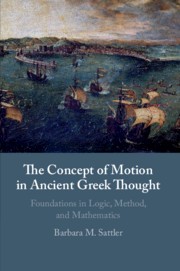Book contents
- The Concept of Motion in Ancient Greek Thought
- The Concept of Motion in Ancient Greek Thought
- Copyright page
- Contents
- Acknowledgements
- Introduction
- 1 Conceptual Foundations
- 2 Parmenides’ Account of the Object of Philosophy
- 3 Zeno’s Paradoxes of Motion and Plurality
- 4 The Atomistic Foundation for an Account of Motion
- 5 The Possibility of Natural Philosophy According to Plato I: The Logical Basis
- 6 The Possibility of Natural Philosophy According to Plato II: Mathematical Advances and Ultimate Problems
- 7 Aristotle’s Notion of Continuity: The Structure Underlying Motion
- 8 Time and Space: The Implicit Measure of Motion in Aristotle’s Physics
- 9 Time as the Simple Measure of Motion
- Bibliography
- Index Locorum
- General Index
9 - Time as the Simple Measure of Motion
Published online by Cambridge University Press: 28 September 2020
- The Concept of Motion in Ancient Greek Thought
- The Concept of Motion in Ancient Greek Thought
- Copyright page
- Contents
- Acknowledgements
- Introduction
- 1 Conceptual Foundations
- 2 Parmenides’ Account of the Object of Philosophy
- 3 Zeno’s Paradoxes of Motion and Plurality
- 4 The Atomistic Foundation for an Account of Motion
- 5 The Possibility of Natural Philosophy According to Plato I: The Logical Basis
- 6 The Possibility of Natural Philosophy According to Plato II: Mathematical Advances and Ultimate Problems
- 7 Aristotle’s Notion of Continuity: The Structure Underlying Motion
- 8 Time and Space: The Implicit Measure of Motion in Aristotle’s Physics
- 9 Time as the Simple Measure of Motion
- Bibliography
- Index Locorum
- General Index
Summary
This chapter discusses the central question why Aristotle, in spite of having everything required to conceptualize a complex measure of speed in terms of time and space, did in the end not explicitly develop such a measure. It is first investigated whether contemporaries of Aristotle may have worked with such a complex measure of speed, and concluded that it cannot be found in either of the two thinkers most likely to have done so, namely Eudoxus and Autolycus. The second part of the chapter investigates what made Aristotle cling to a simple measure and suggests that there are mathematical and metaphysical reasons: metaphysically, Aristotle cannot explicitly accommodate a relation as a measure of motion, since relations are derivative and problematic for him; mathematically, the principle of homogeneity which derives from the realm of Greek mathematics makes it impossible to combine of different dimensions in a single measure in the way needed for measuring speed in a mathematically informed physics such as Aristotle’s.
Information
- Type
- Chapter
- Information
- The Concept of Motion in Ancient Greek ThoughtFoundations in Logic, Method, and Mathematics, pp. 385 - 403Publisher: Cambridge University PressPrint publication year: 2020
